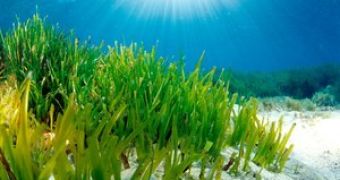With a new environmental campaign aimed at counteracting ocean acidification already on the roll, as we previously reported, it seems that scientists are losing no time in coming up with ways to protect our marine wildlife from this threat.
New studies indicate that simply by having seagrass grow close to coral reefs, the latter might be kept safe from erosion, a phenomenon that is presently taking its toll on our oceans.
As ZeeNews explains, coral reefs are currently affected by the fact that, as carbon dioxide concentrations in the atmosphere keep going up, various quantities of this chemical compound are absorbed by our planet's oceanic waters.
This leads to their becoming ever more acidic and eating away at the coral reefs.
Although coral reefs are in themselves mere conglomerates of worm-like creatures, they are nevertheless crucial for the wellbeing of underwater ecosystems as they house countless fish species.
The news that seagrass might help restore balance to our ocean's chemistry comes to us from Dr. Richard Unsworth, Swansea University, UK.
Thus, he explains that said underwater plant is so efficient in photosynthesizing CO2, that having it close to coral reefs would result in the close-by waters becoming more alkaline, rather than acidic.
As he puts it in one of his most recent interviews, “Highly productive tropical seagrasses often live adjacent to or among coral reefs and photosynthesise at such rates you can see the oxygen they produce practically bubbling away.”
Apparently, Dr. Richard Unsworth also told reporters that “We wanted to understand whether this could be a major local influence on seawater and the problems of ocean acidification.”
However, the specialist also warns that, sooner or later, human activities such as over-fishing and industries that cause chemical pollution might keep the seagrass from doing its job of protecting our oceans, unless something is done to either better control, or end them altogether.
Dr. Richard Unsworth's findings can be read in the “Open Access Environmental Research Letters,” a renowned research journal focusing on climate change and its consequences.

 14 DAY TRIAL //
14 DAY TRIAL //